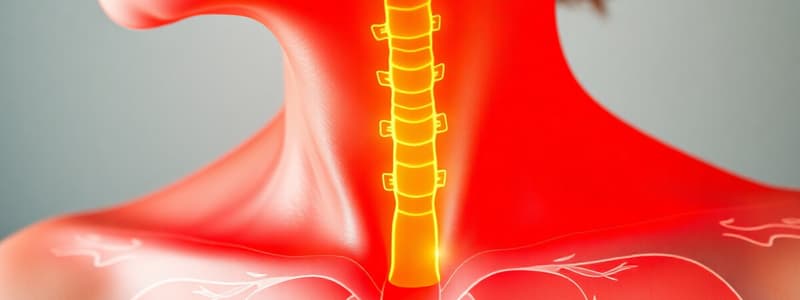Podcast
Questions and Answers
What is the primary cause of goitre?
What is the primary cause of goitre?
Which type of thyroid cancer is most common?
Which type of thyroid cancer is most common?
What is the main function of parathyroid hormone (PTH)?
What is the main function of parathyroid hormone (PTH)?
What are the symptoms of hyperthyroidism?
What are the symptoms of hyperthyroidism?
Signup and view all the answers
Which of the following statements about Hashimoto's disease is true?
Which of the following statements about Hashimoto's disease is true?
Signup and view all the answers
What role does insulin play in the body?
What role does insulin play in the body?
Signup and view all the answers
Which component is not part of the exocrine function of the pancreas?
Which component is not part of the exocrine function of the pancreas?
Signup and view all the answers
What does an increase in the size of the thyroid gland typically indicate?
What does an increase in the size of the thyroid gland typically indicate?
Signup and view all the answers
What is the primary role of T3 and T4 in children?
What is the primary role of T3 and T4 in children?
Signup and view all the answers
Which of the following causes can lead to hypothyroidism?
Which of the following causes can lead to hypothyroidism?
Signup and view all the answers
How does the body regulate the secretion of T3 and T4?
How does the body regulate the secretion of T3 and T4?
Signup and view all the answers
What is a significant dietary requirement for the production of T3 and T4?
What is a significant dietary requirement for the production of T3 and T4?
Signup and view all the answers
Which condition is characterized by extreme sleepiness and sluggishness?
Which condition is characterized by extreme sleepiness and sluggishness?
Signup and view all the answers
What type of thyroid disorder is caused by antibodies stimulating TSH receptors?
What type of thyroid disorder is caused by antibodies stimulating TSH receptors?
Signup and view all the answers
Which hormone is released by the hypothalamus to stimulate the anterior pituitary gland?
Which hormone is released by the hypothalamus to stimulate the anterior pituitary gland?
Signup and view all the answers
What can result from a deficiency of T3 and T4 in children?
What can result from a deficiency of T3 and T4 in children?
Signup and view all the answers
What is the primary role of the thyroid gland in relation to metabolism?
What is the primary role of the thyroid gland in relation to metabolism?
Signup and view all the answers
Which hormone produced by the thyroid gland is known as the active form?
Which hormone produced by the thyroid gland is known as the active form?
Signup and view all the answers
What is the effect of T3 and T4 on the basal metabolic rate (BMR)?
What is the effect of T3 and T4 on the basal metabolic rate (BMR)?
Signup and view all the answers
How do T3 and T4 affect cardiovascular functions?
How do T3 and T4 affect cardiovascular functions?
Signup and view all the answers
What role does calcitonin play in calcium homeostasis?
What role does calcitonin play in calcium homeostasis?
Signup and view all the answers
What effect do T3 and T4 hormones have on glucose metabolism?
What effect do T3 and T4 hormones have on glucose metabolism?
Signup and view all the answers
Which symptoms could result from an excess of T3 and T4 hormones?
Which symptoms could result from an excess of T3 and T4 hormones?
Signup and view all the answers
Which statement accurately describes the function of the pancreas?
Which statement accurately describes the function of the pancreas?
Signup and view all the answers
What is the primary function of glucagon in the body?
What is the primary function of glucagon in the body?
Signup and view all the answers
Which type of diabetes is characterized by insufficient insulin production due to the destruction of beta cells?
Which type of diabetes is characterized by insufficient insulin production due to the destruction of beta cells?
Signup and view all the answers
What is a common management strategy for Type 2 Diabetes?
What is a common management strategy for Type 2 Diabetes?
Signup and view all the answers
What condition is characterized by insulin resistance and is often associated with obesity?
What condition is characterized by insulin resistance and is often associated with obesity?
Signup and view all the answers
What is the normal fasting blood glucose level range considered healthy?
What is the normal fasting blood glucose level range considered healthy?
Signup and view all the answers
Which hormone inhibits the release of both insulin and glucagon in the pancreas?
Which hormone inhibits the release of both insulin and glucagon in the pancreas?
Signup and view all the answers
What is a potential complication for individuals with poorly managed Type 1 Diabetes?
What is a potential complication for individuals with poorly managed Type 1 Diabetes?
Signup and view all the answers
Which type of diabetes is often diagnosed in pregnant women and can lead to future type 2 diabetes risk?
Which type of diabetes is often diagnosed in pregnant women and can lead to future type 2 diabetes risk?
Signup and view all the answers
What is the primary function of insulin?
What is the primary function of insulin?
Signup and view all the answers
Which hormone is primarily responsible for reducing blood calcium levels?
Which hormone is primarily responsible for reducing blood calcium levels?
Signup and view all the answers
What triggers the release of thyroid-stimulating hormone (TSH)?
What triggers the release of thyroid-stimulating hormone (TSH)?
Signup and view all the answers
Which condition is characterized by the destruction of beta cells in the pancreas?
Which condition is characterized by the destruction of beta cells in the pancreas?
Signup and view all the answers
Which of the following symptoms is associated with hyperthyroidism?
Which of the following symptoms is associated with hyperthyroidism?
Signup and view all the answers
What is a common characteristic of Type 2 diabetes?
What is a common characteristic of Type 2 diabetes?
Signup and view all the answers
What might you expect in laboratory tests for someone with Hashimoto's Thyroiditis?
What might you expect in laboratory tests for someone with Hashimoto's Thyroiditis?
Signup and view all the answers
Which of the following best describes the role of obesity in Type 2 diabetes?
Which of the following best describes the role of obesity in Type 2 diabetes?
Signup and view all the answers
Study Notes
Thyroid Gland and Pancreas
- The thyroid gland regulates metabolism and calcium levels
- Thyroxine (T4): A hormone composed of four iodine atoms and one molecule of tyrosine; a precursor to T3, crucial for metabolism.
- Triiodothyronine (T3): Similar to T4, but with three iodine atoms; the active form of thyroid hormone.
- Calcitonin: Produced by parafollicular (C) cells of the thyroid; reduces calcium levels in the blood, opposing parathyroid hormone (PTH)
- Effects of T3 and T4 in Adults: Increase Basal Metabolic Rate (BMR) by 60-100%; increase tissue sensitivity to catecholamines; promote growth of nervous system, skeletal muscles, and organs; regulate body temperature by increasing heat production; increase cardiac output, leading to skin flushing; increase digestive system motility; enhance glucose metabolism; assist the liver in processing and removing excess cholesterol.
- Effects of T3 and T4 in Children: Essential for nervous system and skeletal/muscle growth; deficiencies can lead to short stature and cognitive impairment.
Formation of T3 and T4
- Iodine Intake: Approximately 1 mg of iodine per week is required in the diet.
- Iodide Transport: Iodine is absorbed as iodide and transported into thyroid cells.
- Iodine Oxidation: Iodide ions are oxidized into iodine atoms.
- Thyroglobulin and Tyrosine: Iodine attaches to tyrosine in thyroglobulin, forming T1, T2, T3, and T4.
Regulation of T3 and T4 Secretion
- Stimuli: Low T3/T4 or low body temperature trigger thyrotropin-releasing hormone (TRH) release.
- TRH and TSH: TRH stimulates the pituitary gland, releasing thyroid-stimulating hormone (TSH), which then stimulates the thyroid to produce T3 and T4.
- Negative Feedback: Elevated levels of T3 and T4 in the blood inhibit further TRH and TSH release.
Thyroid Disorders
- Hypothyroidism:
- Causes: Iodine deficiency, Hashimoto's Thyroiditis, trauma, radiation damage, or ingestion of thyroid hormone.
- Symptoms: Extreme sleepiness, muscular sluggishness, slowed heart rate, low blood pressure, weight gain, constipation, mental slowness, hair loss, dry skin, and myxoedema.
- Hyperthyroidism:
- Causes: Graves' disease (autoimmune disorder), thyroiditis, trauma, radiation, or rare ingestion of thyroid hormone.
- Symptoms: Heat intolerance, increased sweating, skin flushing, weight loss, diarrhoea, tachycardia, elevated blood pressure; nervousness, fine tremor, exophthalmos (protruding eyeballs).
- Thyroid Cancer:
- Types: Papillary carcinoma is the most common type.
- Goitre: Enlarged thyroid gland (caused by iodine deficiency).
Exocrine Function of the Pancreas
- Role in Digestion: The pancreas produces enzymes (amylase, proteases, lipases) that digest proteins, fats, and carbohydrates.
- Secretion: Enzymes are released into the duodenum via the pancreatic duct.
Endocrine Function of the Pancreas
- Insulin: Released by beta cells, promoting glucose uptake, glycogen storage, and lipogenesis, lowering blood glucose.
- Glucagon: Released by alpha cells when blood glucose is low, stimulating glycogenolysis, gluconeogenesis, and lipolysis, raising blood glucose.
- Somatostatin: Inhibits the release of insulin and glucagon.
- Pancreatic Polypeptide (PP): Regulates pancreatic secretion activities and influences hepatic glycogen and gastrointestinal secretions.
Disorders of the Pancreas
- Diabetes Mellitus:
- Type 1 Diabetes: Autoimmune destruction of beta cells, leading to insufficient insulin production. Symptoms include polydipsia (excessive thirst), polyuria (excessive urination), polyphagia (excessive hunger), weight loss, fatigue, and ketones in blood and urine. Management requires insulin administration.
- Type 2 Diabetes: Characterized by insulin resistance or low insulin sensitivity, often associated with obesity. Symptoms are similar to type 1 but typically occurs in older adults. Management includes lifestyle changes (diet and exercise), oral medications, and sometimes insulin.
- Other Types of Diabetes: Gestational Diabetes (pregnancy), Latent Autoimmune Diabetes in Adults (LADA), Maturity-Onset Diabetes of the Young (MODY), and other secondary forms of diabetes.
Diagnosis of Diabetes
- Fasting Blood Glucose: Measures blood glucose after an overnight fast.
- Glucose Tolerance Test: Involves ingesting a glucose solution and monitoring blood glucose levels over time to assess glucose regulation.
Studying That Suits You
Use AI to generate personalized quizzes and flashcards to suit your learning preferences.
Related Documents
Description
Test your knowledge on the endocrine system, focusing on thyroid disorders and hormones. This quiz covers causes, symptoms, and functions related to thyroid health and parathyroid hormone. Perfect for students studying human physiology or endocrinology.




